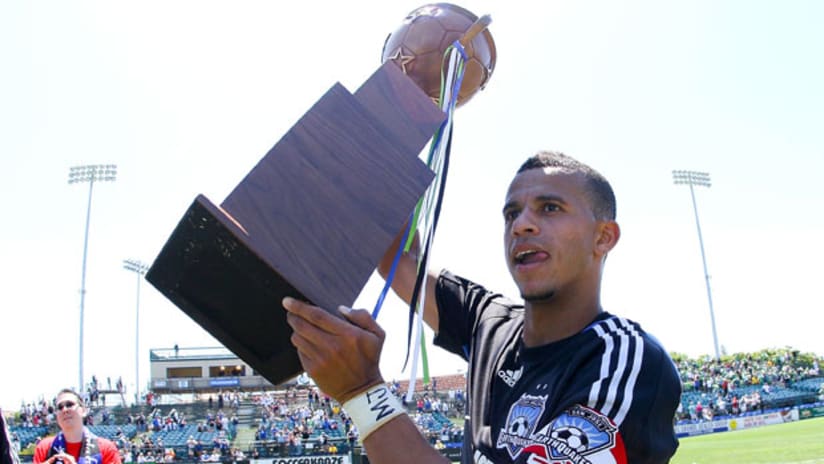The San Jose Earthquakes and Houston Dynamo played to a 0-0 tie in their exhibition match Wednesday evening. The lack of scoring, however, belied plenty of action off the field as Quakes owner Lew Wolff and his players traded volleys in what looks to be the latest phase of the MLS’ collective bargaining talks:
The PR war.
After the players’ union received a shower of media attention last week in the wake of its vote to authorize a strike before the season begins on March 25, MLS owners have launched a counteroffensive in the last 48 hours meant to highlight their side of the story.
“As much as we want to portray ourselves as guys who are looking for simple rights and not money-hungry guys, [the owners] are going to try to paint a picture in their own way, to reflect things good on themselves,” Jason Hernandez told MLSsoccer.com after anchoring San Jose’s back line. “That’s just the art of negotiation.”
Tim Leiweke, chief executive of AEG, the firm that owns the Los Angeles Galaxy, told Reuters on Tuesday that the league will “never, ever agree to change” the single-entity system that players find odious and owners deem necessary—even if that means losing an entire season.
Real Salt Lake co-owner Dave Checketts was quoted in The Deseret News on Wednesday saying that in the event of a strike, owners “will take action that will make life very difficult” for players.
And Joe Roth, majority owner of the Seattle Sounders, suggested that a year-long strike could have a truly devastating effect on the league.
“If somehow we wouldn’t be out there for a year . . . Everyone would lose their jobs,” Roth told The Tacoma News Tribune. “We would all lose our franchises. And that would be that.”
Wolff continued the blitz on Wednesday afternoon, releasing a 658-word statement that repeatedly put the onus of a work stoppage—and any damage it might cause MLS—wholly on the players.
“We do not support or even think about a ‘lock-out’ and we hope that he players will not assume that a strike will be to their benefit or to the benefit of the sport we all love,” Wolff said.
A strike at this point in time would be especially painful to the Quakes. Wolff’s carefully worded statement was equally carefully timed, coming the morning after the club received a green light from the San Jose City Council to move forward with their plans to build a stadium near the Mineta San Jose airport.
“Without labor being a cooperative partner, our plans for a new venue and expansion of our youth program will be set back for a period that certainly does not benefit the current or future players,” Wolff said.
For their part, Wolff’s players took the opportunity to highlight their own cohesion in the face of the impasse.
“Everybody knows what’s at stake,” Hernandez said. “Everyone understands all the different details that are being thrown around. I can’t speak for everyone else, but in the San Jose Earthquakes locker room, everyone is really unified and really united and ready to step up to the challenge if need be. . . . It’s important that the players show the media, show the fans and show the league that we’re together. And we are.”
Goalkeeper Joe Cannon and defender Chris Leitch caught a red-eye flight to Washington, D.C. after the game to join in a meeting of the union’s representatives that begins Thursday and could run until Sunday, depending on how negotiations play out.
“I think we’re asking for reasonable things,” Cannon told MLSsoccer.com. “Our bargaining points and the things that we’re striving for . . . we all feel that it doesn’t do anything to affect the (business) model that’s brought us here. Obviously, both sides look at it differently, and so be it. That’s just the way it is. There’s always two sides, especially in this country. Maybe there needs to be more.”
As the possibility of a strike looms, both sides are aiming to win the hearts and minds of fans who would undoubtedly be disappointed if that does come to pass.
“We just want them to know what’s going on,” Chris Wondolowski said. “I think if they did, and followed us day-in and day-out . . . they would see our side, and kind of see where we’re coming from.
“It’s not necessarily for us. It’s for the generations that hopefully come behind us.”


